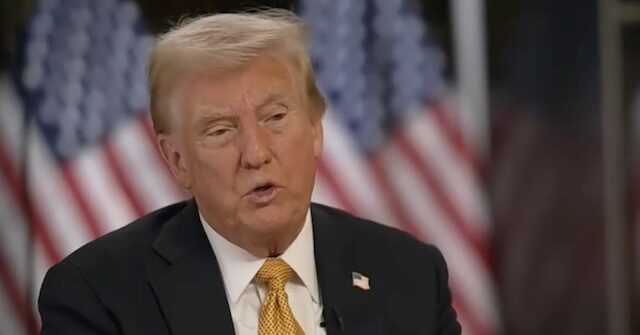In a significant discussion on NBC’s “Meet the Press,” President-elect Donald Trump articulated his stance on the deportation of undocumented immigrants in the United States. He asserted that the nation has “no choice” but to deport all individuals who are living in the country illegally. Trump’s comments suggest a firm approach to immigration enforcement, which includes the possibility of deporting American citizens who are family members of those undocumented individuals. During this conversation, he emphasized that the initial focus would be on deporting criminals, stating, “We’re starting with the criminals,” which implies that there is a distinct categorization in his view of who should be prioritized for removal.
When pressed by host Kristen Welker about the criteria for identifying whom to deport beyond criminals, Trump referred to the need for a broader strategy. He pointed out that convicted murderers will be among the first he targets, signaling an intent to deal with serious offenses when it comes to illegal immigration. This perspective indicates a calculated prioritization of threats to public safety as a justification for his enforcement policies. The discussion also raised concerns about families that include members with mixed immigration statuses, drawing attention to the estimated 4 million families in America that could be impacted by strict deportation measures.
Trump’s response to the issue of mixed-status families revealed a complex dilemma. He mentioned, “I don’t want to be breaking up families,” yet he simultaneously asserted that the only solution to keep families intact would be to deport all members, including those who are legal citizens. This perspective underscores a rigid interpretation of immigration law where the emphasis is placed on the legality of entry rather than the impacts of such actions on family unity. It highlights the tension between enforcing immigration laws and maintaining the social structure of families that could suffer under such policies.
Moreover, Trump underscored the necessity of adhering to established “rules, regulations, [and] laws.” He argued that immigrants who entered the country legally have been treated unfairly compared to those who immigrated illegally. This sentiment reflects a recurring theme in his rhetoric, emphasizing the belief that law-abiding individuals who follow the legal immigration process deserve greater consideration and respect. It suggests a divide between those he views as deserving of-American values and those who he perceives as undermining them through illegal entry.
The discussion surrounding Trump’s immigration stance has sparked debate about the broader implications of mass deportation policies. Critics argue that such measures could lead to significant disruptions in communities where mixed-status families reside, leading to emotional and psychological ramifications for children and other family members who might remain in the country after their parents are deported. This potential fallout raises questions about the effectiveness and humanity of rigid immigration enforcement, especially in cases involving families with children who are U.S. citizens.
Ultimately, Trump’s comments on deportation signal a hardline approach to immigration, rooted in a belief in the necessity of enforcing laws strictly. While he acknowledges the challenges of breaking apart families, he maintains that the rule of law must take precedence, framing the conversation around crime and legality rather than the personal stories of those affected. As this policy debate continues, it remains to be seen how these ideas will translate into concrete actions and the lasting impacts they will have on immigrant communities across the nation.

